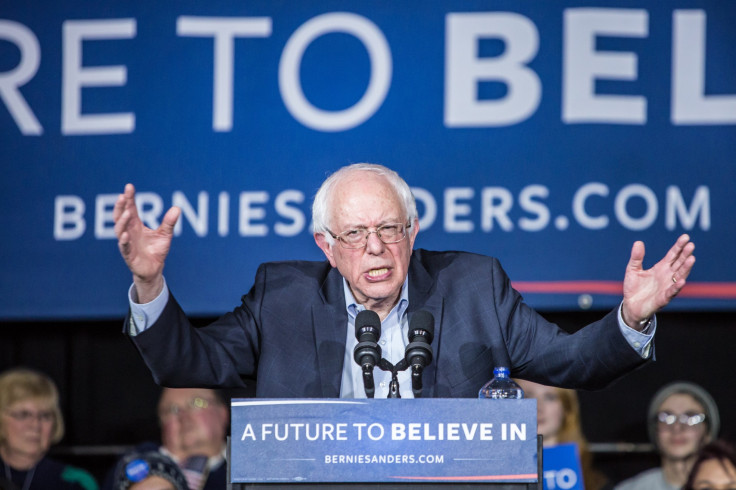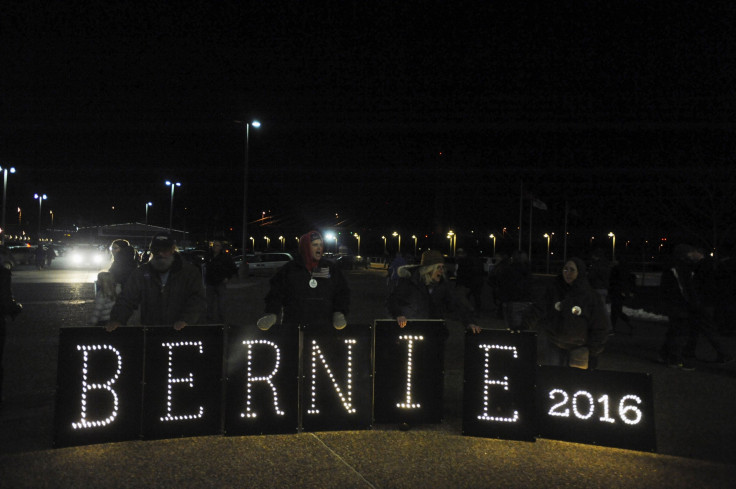Bernie Sanders Is Counting On Independents And Swing Voters Like This Father And Son In Iowa

Not too long ago, you could often find Shawn Jahner listening intently to conservative talk radio hosts like Michael Savage, Sean Hannity or Mark Levin. He believed America needed a good CEO to fix its problems — someone like Mitt Romney, whom he remembers liking as far back as 2008. But now, Jahner, a resident of Des Moines, Iowa, wants “a future to believe in.”
That’s right — Jahner, who works in auto parts at a Ford dealership, has transformed into a supporter and active volunteer for Democratic presidential candidate Bernie Sanders in a year that has seen far-right Republicans take on establishment-backed GOP candidates. “Prior to this, I was stuck in what I call the conservative echo chamber,” Jahner said. “The Republicans we got going right now, it scares the heck out of me.”
As Iowans head to their caucus sites Monday, party switchers like Jahner are likely to help decide the night in favor of either Sanders or the Republican front-runner, Donald Trump. Iowa has a significant bloc of independent voters, and both anti-establishment candidates have been aggressively courting them throughout the campaign. Iowans must be registered with a party to vote, but because they can change their party registration as late as caucus night, those who show up to support a candidate who does not align with their previous party affiliation could tip the scales in races expected to be extremely close.
The Hawkeye State has had a plurality of independents for some time. In 2012, 36.3 percent of active Iowa registered voters were independents, according to state records, and similar numbers existed in 2008. But this year the stakes are higher: State data from the beginning of January 2016 showed independents constituted 40.2 percent of active Iowa registered voters. Democrats held at 31.7 percent, and Republicans were down to 27.6 percent.
Trump has been dominating the GOP field in polls for months, but Texas Sen. Ted Cruz briefly overtook him in Iowa in December and is still well within striking distance in the state. Even Sen. Marco Rubio of Florida, who has maintained a distinct third place, could surprise the New York billionaire if his supporters show up in force.
Sanders, who is battling former Secretary of State Hillary Clinton for the Democratic presidential nomination, has prided himself on appealing to young people, disillusioned voters and independents. He also believes he can win over Trump supporters, whom he described as “working-class people” with “legitimate” angers and fears because of bad economic conditions.
“What I'm suggesting is that what Trump has done with some success has taken that anger, taken those fears — which are legitimate — and converted them into anger against Mexicans, anger against Muslims,” Sanders said in an interview with CBS’ “Face the Nation” in December. “We can make the case that if we really want to address the issues that people are concerned about … we need policies that bring us together, that take on the greed of Wall Street, the greed of corporate America, and create a middle class that works for all of us rather than an economy that works just for a few.”
For Jahner, the first turning point came when he attended a Tea Party rally before the 2008 election. He said he felt disgusted by the corporate involvement in the election process and thought the movement’s anger was what he wanted. He brought a sign advocating for congressional term limits, a position many Republicans support and which Sanders has opposed.
“What I came away with was the feeling that they wanted the right to take everybody’s rights away from them. They wanted to control what rights people had, and I just didn’t feel that was the American way,” Jahner said.
He voted for Libertarian candidate Gary Johnson in 2012 but still listened to talk radio. He eventually heard about Sanders on progressive radio shows, Jahner said, and he connected with the Vermont senator’s bluntness and consistent record.

Jahner’s son Brad, a 29-year-old nurse who lives in a suburb of Des Moines, had a similar political conversion after seeing posts about tuition-free college on Reddit. Brad Jahner was an enthusiastic supporter of Ron Paul, he said, even believing Americans should not pay taxes at the height of his support. Now he describes himself as having Libertarian leanings but still believes he is not suited for any political party.
“I think Bernie Sanders is inspiring a lot of passion. He’s tapping into something in a weird way that Ron Paul tapped into in 2008 and 2012,” the younger Jahner said, a note of revolution in his voice. “There’s this underbelly that really wants something of a third option.”
Because Iowans often make up their minds at the last minute and polls are so unreliable, it is notoriously difficult to predict who will show up on caucus night. But both Jahners said that Sanders has the support to turn out independents and new voters to beat Clinton in their state. Shawn Jahner, who has been making calls and canvassing for Sanders, is even housing a group of volunteers from out of town who are working to get out the caucus ahead of Monday night.
“There are a lot of people that think this needs to change: the government, the political process, the money. These things need to change, and now Bernie comes along and says, ‘I’m going to do that, and here’s what I plan on doing.’ We have a chance,” he said, referring to Sanders supporters, “and they don’t want to let this chance go to waste.”
© Copyright IBTimes 2024. All rights reserved.












